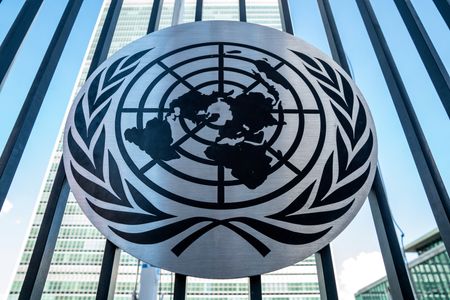By Michelle Nichols
UNITED NATIONS (Reuters) -The United Nations General Assembly overwhelmingly called for an end to a U.S. economic embargo on Cuba despite lobbying by Washington that included sharing an accusation that up to 5,000 Cubans are fighting alongside Russian forces in Ukraine.
It adopted a resolution with 165 votes in favor, seven against and 12 abstentions. The U.S. convinced Argentina, Hungary, North Macedonia, Paraguay and Ukraine to join it and Israel in voting against the resolution.
Last year, the General Assembly adopted the resolution with 187 countries voting in favor. The United States and Israel were the only countries that voted against it, while Moldova abstained.
Cuba has rejected as unfounded the U.S. claims, and released information on legal proceedings against Cubans for mercenary activity in Ukraine. Communist-run Cuba has openly sided with its ally Russia in the conflict while also calling for peace talks.
The U.N. vote carries political weight, but only the U.S. Congress can lift the Cold War-era embargo. The 193-member U.N. General Assembly has adopted the resolution annually for more than three decades - except for 2020 during the COVID pandemic.
“The blockade is a policy of collective punishment,” Cuban Foreign Minister Bruno Rodriguez told the assembly before the vote. “It flagrantly, massively and systematically violates the human rights of Cubans. It makes no distinction between social sectors or economic actors.”
“Cuba will not surrender,” he said.
Deputy U.S. Ambassador to the U.N. Jeff Bartos said a vote in support of "this regime gives it the excuse or seeks to wash its hands of any culpability for its financial crisis and continue to play the blame game instead of implementing meaningful reforms."
"The United States will continue to promote accountability for the communist regime, and their reprehensible behavior on and off the island," he told the assembly after the vote.
Cuban Vice Foreign Minister Carlos Fernandez de Cossio told Reuters in an interview in Havana following the vote that the debate had proven that relatively few countries were susceptible to mounting U.S. pressure against Cuba.
"The U.S. exerted a level of pressure on this occasion that was unprecedented and yet they don't have much to show for it," de Cossio said. "The lesson is that the U.S. has the capacity to intimidate and coerce but it is limited."
The United States consistently has voted against the U.N. resolutions since 1992 but abstained for the first time in 2016 under former President Barack Obama, as Washington and Havana forged a closer relationship.
Washington then returned to opposing the resolution under President Donald Trump's first administration. Trump also rolled back nearly all measures taken by Obama to ease the embargo and improve ties between the United States and its old Cold War foe.
The United States continued to vote no under Trump's successor President Joe Biden's administration.
(Reporting by Michelle Nichols; Additional reporting by Dave Sherwood in Havana; Editing by Maiya Keidan and Daniel Wallis)







